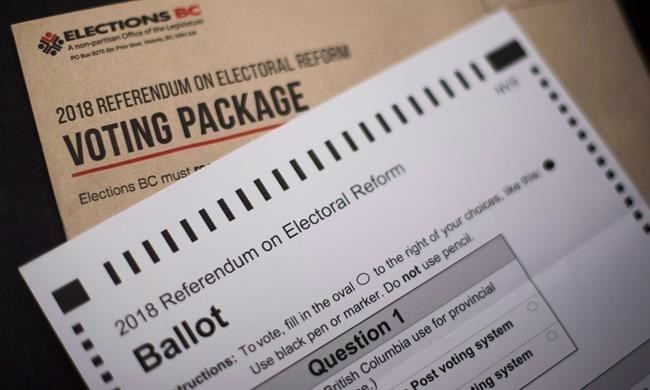
The 2018 Referendum on Electoral Reform package and mail in ballot from Elections B.C. is pictured in North Vancouver, B.C., Thursday, Nov. 1, 2018. As residents of the province vote in an ongoing referendum on electoral reform, the Vote No side is cautioning that the system would allow extremists to be elected with a tiny percentage of votes and hold the balance of power with "disastrous results." THE CANADIAN PRESS /Jonathan Hayward
Republished November 14, 2018 - 3:15 PM
Original Publication Date November 14, 2018 - 11:56 AM
VANCOUVER - Images of burning tires and marching soldiers flash across the screen in a video advertisement warning British Columbia voters that proportional representation provides the "perfect platform" for extremists.
As residents of the province vote in an ongoing referendum on electoral reform, the Vote No side is cautioning that the system would allow extremists to be elected with a tiny percentage of votes and hold the balance of power with "disastrous results."
Suzanne Anton, Vote No co-director and a former attorney general in a previous B.C. Liberal government, pointed as an example to Sweden, where the far-right Sweden Democrats have roots in a neo-Nazi movement and won 18 per cent of the vote in a recent election while also picking up the third most seats in the Parliament.
"The way it plays out in these other countries is that these people can get a foothold. The way it plays out in British Columbia (right now) is that they cannot," Anton said.
It's a chilling message for voters weighing the options of maintaining the existing first-past-the-post system or moving to proportional representation, but two political scientists say the threat is exaggerated.
Maxwell Cameron of the University of British Columbia says proportional representation, a system in which parties gain seats according to the number of votes cast for them, typically has a moderating effect on the political landscape because parties must work together to advance legislation.
"There's no question that we're living in an era of right-wing populism," he said, adding the combination of immigration and the financial crisis has created pressure on some of the most developed welfare states in Europe. But extremism is not created by the electoral system, said Cameron.
"Does the electoral system magnify the potential impact of extremism on politics? Really there's not a lot of evidence to suggest that it does and there's some reason to believe it might actually be the opposite," he said.
"In most places, (extremists) have trouble getting any representation and when they do, they are shunned by most of the other political parties," he said.
Extremists find homes in existing political parties under first-past-the-post systems, he said, it's just less transparent and harder to identify them. And in the case of the Sweden Democrats, a party that wins 10 to 20 per cent of the vote would hold some influence under a first-past-the-post system too, Cameron said.
The models of proportional representation under consideration in B.C. require that a party win a minimum of five per cent of the vote.
Cameron said that's a relatively high threshold that would block true fringe parties from the legislature.
Arend Lijphart, author of "Patterns of Democracy" and professor emeritus at the University of California, San Diego, agrees that while it's true an extremist party could gain seats under the system, the record of other countries shows they typically remain on the periphery.
"Usually these small extremist parties don't go anywhere, they stay on the fringe. It's actually better that they are represented rather than claiming they are constantly kept out of public business, so personally I don't take that as a real, strong argument against proportional representation."
In his home country of the Netherlands, Lijphart said, 150 members of Parliament are elected for one national district, and a party getting two-thirds of one per cent of the vote will get representation, but the fringe parties are, "far from taking over."
Governments that operate under proportional representation systems are typically more diverse, with more women and visible minorities in seats, he said.
"The majority of stable democratic systems have proportional representation. That shows you one thing already, that it's not something to be really afraid of," Lijphart said.
Still, Anton said it won't be positive if parties organized around ethnic lines or single issues join the legislature — a real possibility under proportional representation. She pointed to the separatist Vancouver Island Party, which is running a candidate in the Nanaimo provincial byelection, as an example.
Governments that win by first-past-the-post elections are also inherently moderate, she said.
"You can only pass legislation that the public will go along with otherwise they will turf you in the next election," she said.
Elections B.C. says 6.5 per cent of ballots have been returned to date and mail-in ballots must be received by Nov. 30.
News from © The Canadian Press, 2018